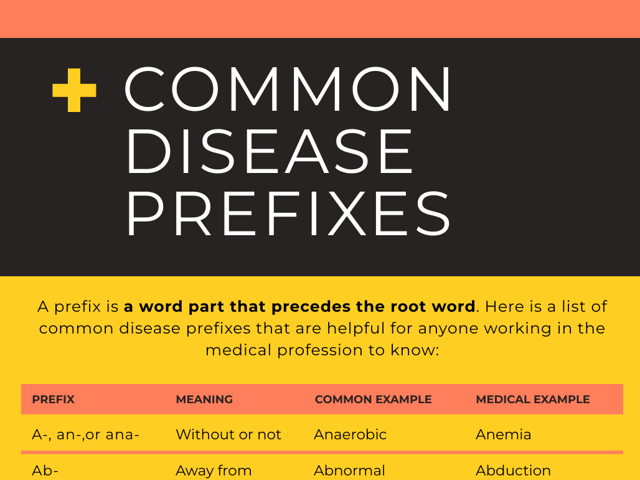
Common Disease Prefixes
Medical terminology serves as the language of healthcare professionals, allowing them to communicate efficiently and precisely about various medical conditions, procedures, and treatments. However, for those not well-versed in the field, it can indeed be overwhelming, often resembling a jumble of complex and unfamiliar words. One of the main culprits contributing to this feeling of bewilderment is the abundance of prefixes used in medical terminology.
What is a Prefix?
A prefix is a word element placed at the beginning of a medical term to modify or qualify its meaning. In the context of diseases and medical conditions, prefixes play a crucial role in describing aspects such as the absence or presence of certain conditions, the direction of movement, the number of parts involved, the degree of severity, and more.
In this blog, we aim to demystify some of the most commonly used disease prefixes, empowering readers like you to confidently approach medical terminology. By shedding light on the meanings behind these prefixes and providing examples, we hope to make the learning process smoother and more enjoyable.
Examples of a Prefix
For instance, let’s take the prefix “anti-.” By understanding that “anti-“ means “opposite or against,” you can quickly grasp the meaning of medical terms like “antagonist” (a substance that opposes the action of another) or “anticoagulant” (a medication that prevents blood clotting). Armed with this knowledge, you can deduce the basic properties of these medical terms even if you have never encountered them before.
Let’s take the prefix “brady-“ as another example. Once you learn that “brady-“ means “slow,” you can understand “bradycardia” as an abnormally slow heart rate. Even without prior knowledge of this specific term, you can logically infer that it refers to a heart-related condition characterized by a reduced heart rate.
With each prefix we explore, we’ll be providing real-life examples that illustrate its usage in medical terminology. For example, “dys-“ or “dis-“ signifies something bad, painful, or difficult, and we can see this in a “dysfunctional,” which refers to something not functioning correctly, or “dysphagia,” indicating difficulty in swallowing. These examples not only demonstrate the meaning of the prefix but also show how it can be used in medical contexts.
Why is Understanding Prefixes Useful to CNAs?
Understanding common disease prefixes is like acquiring a key to unlock the secrets hidden within complex medical terms. It enables you to break down words into their constituent parts and decipher their meanings with greater ease. This newfound proficiency can be immensely beneficial in various scenarios, from reading medical reports to communicating with healthcare professionals effectively.
As we progress through the blog, you’ll discover that the more prefixes you learn, the more interconnected medical terminology becomes. You’ll start recognizing familiar elements in different terms, strengthening your grasp of medical language as a whole.
Common Medical Prefixes
A-, an-, or ana-: Without or not
Words with the prefix A-, an-, or ana- often indicate the absence of something or the negative state.
-
Anaerobic: Living or occurring in the absence of oxygen. Example: Anaerobic bacteria can thrive in environments without oxygen.
-
Anemia: A condition characterized by a deficiency of red blood cells or hemoglobin in the blood. Example: Iron-deficiency anemia results from insufficient iron levels in the body.
Ab-: Away from
The prefix Ab- suggests moving away from a particular location or direction.
-
Abnormal: Deviating from what is considered typical or normal. Example: An abnormal test result might indicate a potential health issue.
-
Abduction: Movement of a body part away from the midline of the body. Example: The abduction of the arm involves lifting it sideways away from the torso.
Ad-: Toward
Conversely, the prefix Ad- indicates movement toward a specific location or direction.
-
Adhere: To stick or bind to a surface. Example: Properly cleaning and dressing a wound can help the bandage adhere to the skin effectively.
-
Adduction: Movement of a body part toward the midline of the body. Example: Adduction of the leg involves bringing it back toward the center of the body.
Anti- or ant-: Opposite or against
The prefixes Anti- or ant- convey opposition or acting against something.
-
Antagonist: A substance that opposes the action of another. Example: In pharmacology, an antagonist can block the effects of a specific drug.
-
Anticoagulant: A medication that prevents blood clotting. Example: Anticoagulants are commonly prescribed to reduce the risk of blood clots.
Bi-: Two
Words beginning with Bi- are related to the number two or having two parts.
-
Bidirectional: Moving in two directions. Example: Computers communicate using bidirectional data transmission.
-
Bicuspid: Having two points or cusps. Example: The bicuspid valve is located between the left atrium and the left ventricle in the heart.
Dys- or dis-: Bad, painful, or difficult
The prefixes Dys- or dis- signify something abnormal, painful, or difficult.
-
Dysfunctional: Not functioning correctly or as expected. Example: A dysfunctional immune system can lead to various health problems.
-
Dysphagia: Difficulty swallowing. Example: Dysphagia can be a symptom of certain neurological or structural issues.
Brady-: Slow
The prefix Brady- denotes slowness or a reduced rate of something.
- Bradycardia: Abnormally slow heart rate. Example: Athletes may experience bradycardia due to their well-trained hearts.
Hemi-: Half or partly
Words with the prefix Hemi- refer to something being half or partially involved.
-
Hemisphere: Half of a spherical object, especially the brain. Example: The left hemisphere of the brain controls language and logical reasoning.
-
Hemiplegia: Paralysis affecting one side of the body. Example: Hemiplegia can result from a stroke or brain injury.
Hyper-: Excessive
The prefix Hyper- suggests excess or an unusually high amount of something.
-
Hypersensitive: Having an exaggerated response to stimuli. Example: People with allergies may be hypersensitive to certain allergens.
-
Hyperthyroidism: Overactivity of the thyroid gland. Example: Hyperthyroidism can lead to weight loss, rapid heart rate, and anxiety.
Hypo-: Under or below
Conversely, the prefix Hypo- indicates deficiency or being below normal.
-
Hypocrite: A person pretending to be virtuous or sincere. Example: Calling someone a hypocrite implies they are not living up to their proclaimed beliefs.
-
Hypoxia: Insufficient oxygen supply to tissues. Example: Hypoxia can occur at high altitudes or due to certain medical conditions.
Post-: After or behind
Words beginning with Post- relate to time or position after a particular event or location.
-
Postscript: Additional information added after the main body of a letter or document. Example: “P.S. I forgot to mention…”
-
Postmortem: Examination of a body after death to determine the cause of death. Example: A postmortem is commonly performed in forensic investigations.
Pre-: Before
Conversely, the prefix Pre- refers to something occurring or existing before a particular event or time.
-
Prepubescent: Occurring before the onset of puberty. Example: Prepubescent children do not experience the physical changes associated with adolescence.
-
Preeclampsia: A condition occurring during pregnancy, characterized by high blood pressure and organ damage. Example: Preeclampsia requires careful monitoring during pregnancy.
Tachy-: Rapid or fast
The prefix Tachy- denotes speed or rapidity.
- Tachycardia: Abnormally fast heart rate. Example: Ventricular tachycardia can be life-threatening and requires immediate medical attention.
| Prefix | Meaning | Common Example | Medical Example |
|---|---|---|---|
| A-, an-, or ana- | Without or not | Anaerobic | Anemia |
| Ab- | Away from | Abnormal | Abduction |
| Ad- | Toward | Adhere | Adduction |
| Anti- or ant- | Opposite or against | Antagonist | Anticoagulant |
| Bi- | Two | Bidirectional | Bicuspid |
| Dys- or dis- | Bad, painful, or difficult |
Dysfunctional | Dysphagia |
| Brady- | Slow | N/A | Bradycardia |
| Hemi- | Half or partly | Hemisphere | Hemiplegia |
| Hyper- | Excessive | Hypersensitive | Hyperthyroidism |
| Hypo- | Under or below | Hypocrite | Hypoxia |
| Post- | After or behind | Postscript | Postmortem |
| Pre- | Before | Prepubescent | Preeclampsia |
| Tachy- | Rapid or fast | N/A | Tachycardia |
Get Ready to Do Well on the CNA Exam!
Understanding common disease prefixes, root words, and suffixes can significantly enhance your ability to interpret medical terms. The next time you encounter a puzzling medical term, break it down using the knowledge you’ve gained from this blog, and you’ll be on your way to medical terminology mastery!
And while understanding medical terminology in theory is essential, applying that knowledge in practice is equally crucial for success in the CNA exam. Engaging in regular practice tests can assess your grasp of medical terms and provide valuable insights into areas that may require further review. By attempting these tests, you’ll familiarize yourself with the format of the exam, become more comfortable with medical terminology questions, and identify any weak points that need strengthening.
Keep Reading

Certified Nursing Assistant Exam Blog
How Long Does it Take to Become a CNA?
As a profession on the frontline of healthcare, Certified Nursing Assis…

Certified Nursing Assistant Exam Blog
How to Do Well on the CNA Skills Test
Over 1.3 million nursing assistants work in our healthcare system today…

Certified Nursing Assistant Exam Blog
What Does a Nursing Assistant (CNA) Do?
Are you interested in exploring medical careers? The healthcare industr…